






Road to Player of the YearMen 'The Master' Nguyen captures fourth Player of the Year titleby Scott Huff | Published: Feb 07, 2006 |
|
|
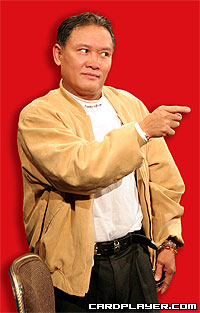 |
Last year was a record-breaking year for tournament poker. Field sizes grew, prize pools ballooned, and millionaires were made on nearly a weekly basis. The World Series of Poker (WSOP) main event boasted a field of more than 5,600 players, and the World Poker Tour (WPT) passed the $100 million mark in total prize money.
Card Player once again took it to task to crown the best tournament poker player in the world.
Throughout the 12-month grind, a rotating cast of veterans and promising newcomers made their way into the top five, and in so doing set themselves apart from the legions of players prompted to take their shot on the tournament circuit by the bright lights, big bucks, and potential fame promised by our poker-crazed globe.
Many dubbed 2005 as "the year of the pro." And after all of the buy-ins were made, all of the rivers were dealt, and all of the bracelets, rings, trophies, and million dollar checks were awarded, Men "The Master" Nguyen – a pro among pros – stood alone atop the Player of the Year leader board for the fourth time in his career.
Nguyen is a world-class player with a dynamic personality who has been a fixture in the poker community since before the boom, and he is still going strong. Throughout 2005, he cashed in events both big and small, making 16 final tables and pocketing close to $1 million. He had victories in three WSOP Circuit preliminary events, and like all great champions, showed his mettle with a dramatic victory to stave off John Phan at the Trump Classic.
Although he was in the midst of a busy week of celebrations, Nguyen spent some time with me to look back on his successful career – from "Money Machine" to "The Master" – and to talk about the importance of his latest achievement.
Scott Huff: You have a ton of hardware – World Series of Poker bracelets, World Poker Open bracelets, diamond rings from the Legends of Poker, and more. This is your fourth Player of the Year award. What does this award mean to you, and how does it rank with your other achievements in the game?
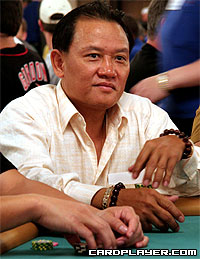 |
Men Nguyen: I am proud of my many poker accomplishments. This year I became the leader in all-time money finishes (49) at the World Series of Poker. I have the most worldwide final-table appearances (149), and won 72 of those events. I've won six WSOP bracelets and two WPO bracelets. I've won 10 watches from various championship events at the Taj Mahal (including two Rolexes for seven-card stud events), four watches from Hall of Fame Poker Classic events at Binion's Horseshoe, and one Rolex for winning the Best All-Around Player award at the World Poker Finals at Foxwoods. At the Legends of Poker, I've won nine rings and three Best All-Around Player titles. I've won three rings in WSOP Tournament Circuit events, and earned a championship ring as the best all-around player at the Four Queens Poker Classic. I have lots of trophies from Commerce Casino, The Bicycle Casino, The Orleans Hotel and Casino, Hollywood Park Casino, and Crystal Park Casino, all from different games. I have won the Player of the Year award four times (1997, 2001, 2003, and 2005). I've won so many titles that it's hard to keep track. It will be very difficult for someone to beat my records!
As for winning the 2005 Player of the Year award, I am truly honored. Many poker players dream of winning the Player of Year award once, so that they can get their names in the record book. I am very fortunate to have won four times. It's very difficult to win the Player of the Year award, because poker has become so popular in the United States. Also, people from all over the world come to the United States to compete in tournaments. Winning a WSOP bracelet is much easier than winning the Player of the Year award, because there are lots of events at the World Series. You have to be consistent to be the best tournament player of the year.
SH: Before we get into this year's Player of the Year race, why don't you tell us how it all began. What games did you cut your teeth on before you became "The Master"? How did you learn the game, and what were some watershed moments on your way to becoming one of the greatest players in the game?
MN: I had just broken up with my first wife and I missed my daughter, Roxana. I was very lonely and had nothing to do. One day, a friend came over and asked me to go to Las Vegas with him on a weekend junket. We went to Caesars Palace. I walked into the poker room and saw people playing seven-card stud. In Vietnam, I used to play no-limit five-card stud with 28 cards. Four cards are up and one card is down. It is much easier to read hands. But here, the game is played with three cards down, so it's harder to read hands. It was very difficult for me to adjust at first. I started at high limits right away, $15-$30. Most people learn by playing at low limits, but not me. I have never read any poker books. I learned by playing and creating my own style. My first time playing at high limits cost me $3,200. It was an expensive first lesson! I flew home after the weekend, since I had a regular job during the week as a machinist at Sun Net Tool. When I went back to Vegas the following weekend, I beat the game.
When I was just starting out, I would fly to Las Vegas each weekend and play seven-card stud at the Dunes. Then, I learned another game, seven-card stud high-low split. It took me a while to adjust because it was a split game. But I loved it, so I kept coming back to play. Every time I went to the Dunes, people were happy to see me, because I would run to the ATM and get more money when I lost. They called me "Money Machine, but they don't call me that anymore. Now they call me "The Master."
In June of 1987, California allowed poker games. I didn't have to travel to Las Vegas to play poker anymore. I played at the Bicycle Club every night after work. I played a lot with Kenny "Skyhawk" Flaton. Two months later, in August of 1987, I won my first poker tournament at the Diamond Jim Brady. I won $28,000 and received my first trophy.
In 1988, at the Super Bowl of Poker tournament at Caesars Palace, I entered a no-limit hold'em event. I had never played no-limit hold'em before. There were 10 people left and it was hand for hand. I got involved in a big pot with Johnny Chan, who was the reigning WSOP champion. I had the Q J
J and raised preflop. Johnny called from the blind. The flop came jack high with two red cards.
and raised preflop. Johnny called from the blind. The flop came jack high with two red cards.
Johnny checked, I bet, and he check-raised me all in. I called and asked him to turn over his cards, but he didn't. The turn and river were blanks, and he mucked his hand. That was the key hand. It helped me win second place and earn $45,000.
Note: 18 years later, Nguyen is still in the dark as to what Chan held.
SH: You told me previously that winning the Player of the Year award would be a miracle, and also would mean a lot for your career. How so?
MN: Early in the year, I had only a few points. It was almost impossible for me to win because I took a lot of time off from poker to do charity events. In August, I went to Atlanta, Georgia, with Scotty Nguyen during the Legends of Poker to raise funds for the children of Vietnam. In November, I went to Minnesota with Linda Johnson to help raise money for the Juvenile Diabetes Research Foundation during the middle of the Foxwoods tournament. Mark Seif, T.J. Cloutier, Mike Sexton, Marcel Luske, and Lyle Berman also participated. The day before the $15,000 main event at the Five-Diamond World Poker Classic at Bellagio, I flew back to Los Angeles and played in a Jewish charity tournament with David Pham at Hawaiian Gardens. I even paid my own airfare and entry fee!
Winning this year reminds me of 2003, when I left for Vietnam in the middle of the Five-Diamond World Poker Classic. I was in the lead for the Player of the Year award, but there were lots of players who could pass me. Amir Vahedi, David Pham, Scotty Nguyen, and "Minneapolis" Jim Meehan were very close. I went to Vietnam to do charity work. No one passed me, and I won the Player of the Year award. I feel like I was rewarded for helping the people in Vietnam and also here in the United States.
I think that winning the 2005 Player of the Year award will mean a lot for my career. There are lots of endorsement opportunities available now because poker is huge. Everyone knows that I like to drink Coronas when I play poker. They should sponsor me! The media likes to focus on the "young guns" of poker, but this year I proved that I am still "The Master."
SH: Because of the size of the fields and the number of top players vying for this prize, does this Player of the Year award mean the most to you of the four that you have won?
MN: Winning the 2005 Player of the Year award means the most because there are so many people playing poker now. It's amazing. When I first played in the World Series, there were more than a few hundred players. This year, there were more than 5,600 players in the main event. If you turn on the television, you can always find a poker tournament to watch. I have a funny story about how popular poker has become. I have known one of my neighbors for many years. We usually talk about our families, life, and so on. I never talked about my poker accomplishments. Recently, he saw me outside my home and asked, "Are you Men 'The Master'?"
I answered, "Yes."
He said, "I saw you in a poker tournament on television. You are very famous! Can I come over to your house?"
All this time, he never knew I was famous until he saw me playing poker on television! I invited him over and showed him my trophies and awards.
SH: You got hot at the end of 2005 and were able to overcome John Phan. Over nearly a six-month period this year, you picked up only 420 points. What happened during that stretch and how were you able to overcome that cold run to take the title?
MN: I was very busy with my charity work. I even took some time off before the World Series to go to Vietnam with my wife, Van. We distributed 1,300 tons of rice to feed the hungry people in Vietnam. We needed two trucks for all the rice. Each family got 15 kilos of rice. We also built indoor playgrounds for the schoolchildren, and gave them toys and books to read. There are lots of pictures of my charity work on my website at http://www.menmaster.com/.
When I came back for the World Series, I was rested and ready to kick ass. I cashed in several events and became the all-time leader in money finishes. Later that month, I went to Phil Hellmuth's birthday party in Hollywood. I played in a charity event at the party for the AIDS Project Los Angeles with Phil, Phil's beautiful wife, John Hennigan, and Amir Vahedi. I got to heads up with Phil's wife, and got lucky and won. After the tournament was over, I told Phil, "I cannot beat you heads up, but at least I can beat your wife at the poker table!" Earlier in the year, Phil beat me in the National Heads-Up Poker Championship at the Golden Nugget. Phil, if you are reading this interview, you still owe me a trophy for my collection!
A few weeks later, I won the first event at the Legends of Poker tournament at the Bike. I beat more than 600 people and won $42,000, but I didn't get any points because the buy-in was only $200. Winning that event gave me a lot of confidence. Then, I won two events and finished third in another at the WSOP Tournament Circuit at Harrah's. I was happy to add two rings to my collection. I made three final tables in four events and broke my personal record. My good friend Jon Setoguchi was following the tournaments on the Internet and called me to tell me that I was back in contention for Player of the Year.
Note: Nguyen smelled the blood in the water, and like the old-school shark that he is, he dove in and attacked. But winning Card Player's Player of the Year award is never easy. For the third straight year, it would come down to a dramatic final tournament before a winner could be determined. The Trump Classic was the stage for this year's drama, and not only did the curtain have to wait for the final event, it had to wait for the final table.
SH: Talk about traveling to the Taj to basically take on John Phan head-to-head for the Player of the Year award.
MN: John was eliminated on day one of the Five-Diamond World Poker Classic at Bellagio. After I was eliminated on day two, John and I left for Atlantic City to play the final three events of the Trump Classic tournament at the Taj Mahal. We both entered the $300 no-limit hold'em event. If I made the top seven, John would not be able to pass me. If I finished in eighth or ninth place, John would have to win the event. John played very well, but so did I. We both made the final table. I won first place and John finished third. I held on to my points lead and won the Player of the Year award.
Beating John at the Taj Mahal in the final event of the year reminded me of 2001, when I was battling John Juanda for the Player of the Year award. It also came down to the final event at the Taj. John and I reached the final table of the $7,500 no-limit hold'em championship. I beat him and won the Player of the Year award.
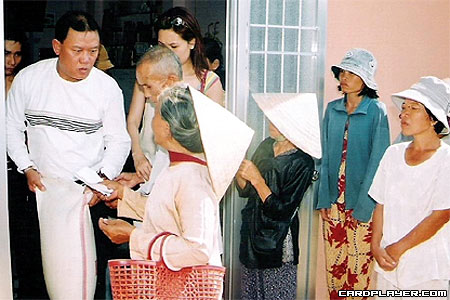 |
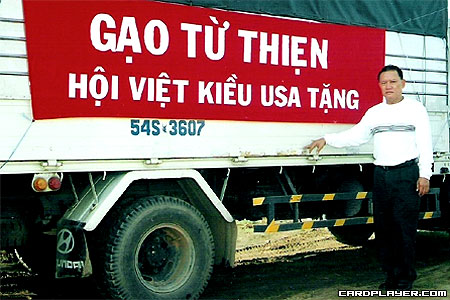 |
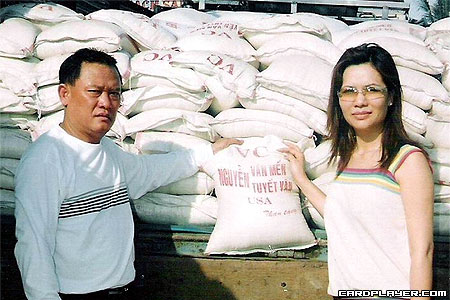 |
|
Men Nguyen frequently visits his home nation, Vietnam, to perform charity work. Besides distributing truckloads of rice, Nguyen has also built a kindergarten school.
|
SH: You seem to turn it on when the pressure is on. What adjustments do you make in your game or mindset that enable you to perform at your peak when you absolutely must?
MN: I handle pressure well and am very determined to win. When you see some players at the final table, they get very nervous, but not me. I've been at lots of final tables, so it's easy to keep my focus and concentrate on winning. I also believe that I am very blessed. I have three daughters (Mulan, Anna, and Tiffany) who have the same birthday. They were born on the same day and the same month, just four years apart.
SH: I overheard another tournament pro saying that in the smaller buy-in events, you are able to intimidate and run over the competition. Is that true? How much has being a recognizable poker personality – "The Master" – factored into your success?
MN: Sometimes it's tough to play in smaller buy-in events. People like to gamble against me with bad hands so that they can tell their friends they knocked out "The Master." They have nothing to lose. When I play smaller buy-in events, I play aggressively and try to build my chips. But even if it's a small event, I will play as long as it takes to win. I remember playing a WSOP Tournament Circuit event at Bally's this year. When I got to heads up, I called my wife in Los Angeles to tell her the good news. I played heads up for almost six hours. It took so long that my wife was able to drive from Los Angeles to Las Vegas and watch me win another ring for my collection.
SH: You had a lot of success this year in the WSOP Circuit events, and were runner-up in the main event in Indiana. You didn't have quite as much success in WPT events. Is there a difference in the structure that made that difference, or was it just coincidence?
MN: When I went to Caesars Indiana, I played in two events. I finished seventh in the $2,000 buy-in event and second in the $10,000 main event. I also played well in the WSOP Tournament Circuit events at Harrah's and Bally's. I got lots of points for the Player of the Year award and moved closer to the lead.
As for the WPT events, I always try to do my best so it's probably a coincidence. In March, I made the final table at the WPT Shooting Star at Bay 101. I was very unlucky when Danny Nguyen made quad jacks to beat me. Danny raised from early position, Gus Hansen called, and I reraised all in preflop with pocket queens. "All you can eat, baby!"
Unfortunately, Danny called and "ate" all of my chips! The flop was rags. However, the turn was a jack and the river was another jack. If I had won that hand, I would have been close to the chip lead. I would have been in a great position to win my first WPT title. But, that's poker. It won't change me, because I'm still "The Master." Next year, I'm going to win a WPT event for my fans.
SH: You play in lots of tournaments. When you've played for millions of dollars, how do you maintain your focus for the smaller buy-in events that sometimes pay only 20 or 30 thousand?
MN: I play all the tournaments because I love to play poker. It doesn't matter if it's a big tournament or a small tournament. Some professionals won't play if the tournament buy-in is small. I give everyone a chance to play against me so that they can tell their friends they played against "The Master." I also play lots of tournaments so that I can add to my trophy collection!
SH: You are in the hunt every year for the Player of the Year award. How do you manage to play at the top of your game every year and avoid extended "bad runs"?
MN: During a bad run, I go to Vietnam and visit the temple. I also visit students at the kindergarten school that I built. Visiting my family back home and doing charity events allows me to get refreshed and ready to take on more tournaments.
I always contend for the Player of the Year award because I'm consistent, and I play all poker games well. If you name any poker game, I play it. Even when I didn't win the Player of the Year award, I still finished in the top 10. I finished fourth in 1998, third in 2000, and fifth in 2002.
SH: What adjustments have you made in your game to stay on top of the poker world as the fields have gotten larger?
MN: I like to play in poker tournaments with large fields because there is more money in the prize pool. Also, I know that if I am running well that day, I will have a good chance to make the final table. In large tournaments, other players get a lot of chips early, but they give them away. I know how to stay patient and wait for opportunities. Then, I take their chips. When I have chips, I don't give them back.
SH: The majority of your point-earning performances were in no-limit hold'em events. Have you worked more on your no-limit hold'em game now that the majority of tournaments are of that variety?
MN: Yes, no-limit hold'em is the game of poker right now. Everyone loves to play no-limit hold'em, so I have worked hard to improve my game.
SH: In reality, is it less important to be an all-around player these days than it is to have a strong no-limit game?
MN: For cash games, it's important to know how to play all of the poker games. When I play high limits at the Bike, it's a mixed game. But for tournaments, you have to be a strong no-limit hold'em player.
SH: We know that you also teach other poker players, and in fact, that is how you got your nickname. What are the requirements for becoming a student of "The Master"?
MN: I don't have any students right now because the tournament buy-ins are so high and it costs a lot of money to travel around the country. If you played in all of the tournaments this year, it would probably cost about $500,000. If someone is willing to learn, I will teach him tournament strategy, but he has to know the basics. And he has to pay, of course!
SH: David Pham and C.K. Hua were both students of yours, and both have become highly successful and respected poker professionals. In fact, both were in the final top 10 in the Player of the Year standings in 2004. What personal qualities make you a great poker player and also a great teacher?
MN: David "The Dragon" Pham came to this country in 1989. I sent him to learn how to speak English. At night, I taught him to play poker. His strongest game is no-limit hold'em. He won the Player of the Year award in 2000 and was the runner-up in 2004. Can Hua is also very good at no-limit hold'em. He finished ninth last year and has made several final tables in WPT events. David and Can are so successful that they play on their own now. I am very proud of them. One day, I hope we all make the final table at the World Series. I taught them well, but I still have a few secrets that only "The Master" knows!
I'm a great poker player because I can read people. When I play at a table, I watch the other players to see if they are loose or tight. Then, I can adjust my style against them. It doesn't matter what I have. I just play the hand against them based on what I observe. Also, because of my reading ability, I can play more hands. I think I'm a great teacher because I've played poker for many years and I remember all the hands I've played. I think about the hands, and create different styles and strategies for the next time I play. I tell my students to get a good night's sleep before a big tournament, so that they will be well-rested and prepared to play poker for 14 hours the next day. I also like to sit around the poker table and go over strategy and discuss how to make plays.
SH: Give us some of the four-time Player of the Year's tips to becoming a world-class poker player.
MN: Patience at the table is the most important factor in becoming a world-class poker player. Bankroll is also very important. You must manage your bankroll. Don't play with more than you can afford to lose. Set limits and stick to them. Don't go on tilt and blow your whole bankroll in one session. Finally, get at least seven-eight hours of sleep before a big tournament, so that you will be in the proper mindset and can concentrate on playing your best. If you want more poker tips, visit my website at http://www.menmaster.com.
|
||||||||||||||||||||||||||||||||||||||||||||||||||||||||||||||||||||||||||||||||||||||||||||||||||||||
SH: You've been around the poker world for a long time. Do you think that the truly great poker players in the future – future Player of the Year award winners, if you will – will come from the Internet, or from grinding it out and taking their lumps the way you did in your "Money Machine" days?
MN: I think the best players in the future will come from the high-stakes live games. That's where you learn to read people. If you can beat the high-stakes live games, you are already a good player and should be consistently successful.
SH: Speaking of online poker, do you play on the Internet? Do you have any tournament wins to boast about this year that people don't even know about?
MN: Yes, I play poker on the Internet. I play at poker4ever.com. I prefer to play cash games rather than tournaments. The tournaments take a long time to play because there are so many players. Also, if I win an online tournament, I don't get to add a trophy or ring to my collection.
SH: Whose game, out of the top five runners-up in Card Player's Player of the Year standings, impressed you the most?
MN: Although they are not in the top five this year, I admire Scotty Nguyen, Phil Hellmuth, and David "The Dragon" Pham.
SH: Are you looking forward to the Card Player and Bodog Player of the Year party? It's in your home state. Does it get any better than that?
MN: Winning the Player of the Year award was the hard part. Celebrating is the easy part. I am very happy to attend this event, but I think my daughter Roxana is even more excited. She is anxious to meet all the famous poker players and Hollywood celebrities. She is beautiful, so I will need to keep an eye on her! I hear that it's going to be a red-carpet event, so the only thing I am worried about is that I might have to wear a tuxedo. Do you know where I can get a nice Armani tux?
SH: Will a black Armani suit do? I think I have one. I'll trade you for poker lessons. I have one final question: The 2006 Player of the Year will be?
MN: Is that a trick question? Men "The Master," of course!
Before I go, I want to thank my family and friends for supporting me this year. I also want to thank America for giving me this great opportunity to do what I want to do in life, and for allowing me to provide for my family. America has made all of my dreams come true. God bless America! 
Features